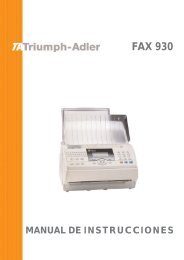- Page 1:
Instruction Manual DCC 6520 | 6525
- Page 4:
CD-ROM/DVD (Product Library) Operat
- Page 7 and 8:
Logout ............................
- Page 9 and 10:
Language ..........................
- Page 12 and 13:
Quick Guide It copies. It prints. W
- Page 14 and 15:
It faxes. To send a FAX As well as
- Page 16 and 17:
One Touch Key (page 6-17) Address B
- Page 18 and 19:
Print Job Status (page 8-3) Send Jo
- Page 20 and 21:
Cassette/MP Tray Settings (page 9-8
- Page 22 and 23:
Copy (page 9-15) Auto Paper Selecti
- Page 24 and 25:
System (page 9-18) Network (page 9-
- Page 26 and 27:
1 Preface This chapter explains the
- Page 28 and 29:
Preface > Notice Environment The se
- Page 30 and 31:
Preface > Notice Legal Restriction
- Page 32 and 33:
Preface > Legal and Safety Informat
- Page 34 and 35:
Preface > Legal and Safety Informat
- Page 36 and 37:
Preface > About this Operation Guid
- Page 38 and 39:
2 Preparation before Use This chapt
- Page 40 and 41:
Preparation before Use > Part Names
- Page 42 and 43:
Preparation before Use > Part Names
- Page 44 and 45:
Preparation before Use > Part Names
- Page 46 and 47:
Preparation before Use > Determinin
- Page 48 and 49:
Preparation before Use > Connecting
- Page 50 and 51:
Preparation before Use > Power On/O
- Page 52 and 53:
Preparation before Use > Installing
- Page 54 and 55:
Preparation before Use > Installing
- Page 56 and 57:
Preparation before Use > Installing
- Page 58 and 59:
Preparation before Use > Energy Sav
- Page 60 and 61:
Preparation before Use > Embedded W
- Page 62 and 63:
Preparation before Use > Embedded W
- Page 64 and 65:
3 Common Operations This chapter ex
- Page 66 and 67:
Common Operations > Loading Paper L
- Page 68 and 69:
Common Operations > Loading Paper L
- Page 70 and 71:
Common Operations > Loading Origina
- Page 72 and 73:
Common Operations > Loading Origina
- Page 74 and 75:
Common Operations > Checking the Co
- Page 76 and 77:
Common Operations > Login/Logout Si
- Page 78 and 79:
Common Operations > Favorites 3 4 5
- Page 80 and 81:
Common Operations > Favorites 6 Reg
- Page 82 and 83:
Common Operations > Favorites [Perm
- Page 84 and 85:
Common Operations > Favorites When
- Page 86 and 87:
Common Operations > Shortcuts 4 5 6
- Page 88 and 89:
Common Operations > Shortcuts Using
- Page 90 and 91:
Common Operations > Quick Setup Wiz
- Page 92 and 93:
Common Operations > Canceling Jobs
- Page 94 and 95:
Common Operations > Using Various F
- Page 96 and 97:
Common Operations > Using Various F
- Page 98 and 99:
Common Operations > Using Various F
- Page 100 and 101:
Common Operations > Using Various F
- Page 102 and 103:
Common Operations > Using Various F
- Page 104 and 105:
Common Operations > Using Various F
- Page 106 and 107:
Common Operations > Using Various F
- Page 108 and 109:
Common Operations > Using Various F
- Page 110 and 111:
Common Operations > Using Various F
- Page 112 and 113:
Common Operations > Using Various F
- Page 114 and 115:
Common Operations > Using Various F
- Page 116 and 117:
Common Operations > Using Various F
- Page 118 and 119:
Common Operations > Using Various F
- Page 120 and 121:
Common Operations > Using Various F
- Page 122 and 123:
Common Operations > Using Various F
- Page 124 and 125:
Common Operations > Using Various F
- Page 126 and 127:
Common Operations > Using Various F
- Page 128 and 129:
4 Copying This chapter explains the
- Page 130 and 131:
Copying > Basic Operation 5 Enterin
- Page 132 and 133:
Copying > Copying Functions Zoom Ad
- Page 134 and 135:
Copying > Copying Functions [Zoom E
- Page 136 and 137:
Copying > Copying Functions NOTE Th
- Page 138 and 139:
Copying > Copying Functions 6 Selec
- Page 140 and 141:
Copying > Copying Functions 1 2 Dis
- Page 142 and 143:
Copying > Copying Functions EcoPrin
- Page 144 and 145:
Copying > Copying Functions Color B
- Page 146 and 147:
Copying > Copying Functions Auto Im
- Page 148 and 149:
5 Printing This chapter explains th
- Page 150 and 151:
Printing > Printing from Applicatio
- Page 152 and 153:
Printing > Printing from Applicatio
- Page 154 and 155:
Printing > Printing Data Saved on t
- Page 156 and 157:
Printing > Printing Data Saved on t
- Page 158 and 159:
Printing > Printing Data Saved on t
- Page 160 and 161:
6 Sending This chapter explains the
- Page 162 and 163:
Sending > Basic Operation 1 Press t
- Page 164 and 165:
Sending > Preparation for Sending a
- Page 166 and 167:
Sending > Preparation for Sending a
- Page 168 and 169:
Sending > Preparation for Sending a
- Page 170 and 171:
Sending > Preparation for Sending a
- Page 172 and 173:
Sending > Preparation for Sending a
- Page 174 and 175:
Sending > Specifying Destination Sp
- Page 176 and 177:
Sending > Specifying Destination Ch
- Page 178 and 179:
Sending > Specifying Destination Sp
- Page 180 and 181:
Sending > Specifying Destination 5
- Page 182 and 183:
Sending > Specifying Destination Se
- Page 184 and 185:
Sending > Registering Destinations
- Page 186 and 187:
Sending > Registering Destinations
- Page 188 and 189:
Sending > Registering Destinations
- Page 190 and 191:
Sending > Registering Destinations
- Page 192 and 193:
Sending > Adding a Destination on O
- Page 194 and 195:
Sending > Adding a Destination on O
- Page 196 and 197:
Sending > Sending Functions Sending
- Page 198 and 199:
Sending > Sending Functions File Se
- Page 200 and 201:
Sending > Sending Functions FTP Enc
- Page 202 and 203:
Sending > WSD Scan 3 4 Display the
- Page 204 and 205:
Sending > Scanning using TWAIN Scan
- Page 206 and 207:
7 Document Box This chapter explain
- Page 208 and 209:
Document Box > Printing Documents S
- Page 210 and 211:
Document Box > Saving Documents to
- Page 212 and 213:
Document Box > Saving Documents to
- Page 214 and 215:
Document Box > Functions for Docume
- Page 216 and 217:
Document Box > Functions for Docume
- Page 218 and 219:
Document Box > Functions for Docume
- Page 220 and 221:
Document Box > Functions for Docume
- Page 222 and 223:
8 Status / Job Cancel This chapter
- Page 224 and 225:
Status / Job Cancel > Checking Job
- Page 226 and 227:
Status / Job Cancel > Checking Job
- Page 228 and 229:
Status / Job Cancel > Sending the L
- Page 230 and 231:
Status / Job Cancel > Sending the L
- Page 232 and 233:
Status / Job Cancel > Check of Devi
- Page 234 and 235:
Status / Job Cancel > Checking the
- Page 236 and 237:
9 Setup, Registration, and User Man
- Page 238 and 239:
Setup, Registration, and User Manag
- Page 240 and 241:
Setup, Registration, and User Manag
- Page 242 and 243:
Setup, Registration, and User Manag
- Page 244 and 245:
Setup, Registration, and User Manag
- Page 246 and 247:
Setup, Registration, and User Manag
- Page 248 and 249:
Setup, Registration, and User Manag
- Page 250 and 251:
Setup, Registration, and User Manag
- Page 252 and 253:
Setup, Registration, and User Manag
- Page 254 and 255:
Setup, Registration, and User Manag
- Page 256 and 257:
Setup, Registration, and User Manag
- Page 258 and 259:
Setup, Registration, and User Manag
- Page 260 and 261:
Setup, Registration, and User Manag
- Page 262 and 263:
Setup, Registration, and User Manag
- Page 264 and 265:
Setup, Registration, and User Manag
- Page 266 and 267:
Setup, Registration, and User Manag
- Page 268 and 269:
Setup, Registration, and User Manag
- Page 270 and 271:
Setup, Registration, and User Manag
- Page 272 and 273:
Setup, Registration, and User Manag
- Page 274 and 275:
Setup, Registration, and User Manag
- Page 276 and 277:
Setup, Registration, and User Manag
- Page 278 and 279:
Setup, Registration, and User Manag
- Page 280 and 281:
Setup, Registration, and User Manag
- Page 282 and 283:
Setup, Registration, and User Manag
- Page 284 and 285:
Setup, Registration, and User Manag
- Page 286 and 287:
Setup, Registration, and User Manag
- Page 288 and 289:
Setup, Registration, and User Manag
- Page 290 and 291:
Setup, Registration, and User Manag
- Page 292 and 293:
Setup, Registration, and User Manag
- Page 294 and 295:
Setup, Registration, and User Manag
- Page 296 and 297:
Setup, Registration, and User Manag
- Page 301 and 302:
Setup, Registration, and User Manag
- Page 303 and 304:
Setup, Registration, and User Manag
- Page 305 and 306:
Setup, Registration, and User Manag
- Page 307 and 308:
Setup, Registration, and User Manag
- Page 309 and 310:
Setup, Registration, and User Manag
- Page 311 and 312: Setup, Registration, and User Manag
- Page 313 and 314: Troubleshooting > Toner Container R
- Page 315 and 316: Troubleshooting > Waste Toner Box R
- Page 317 and 318: Troubleshooting > Cleaning Cleaning
- Page 319 and 320: Troubleshooting > Solving Malfuncti
- Page 321 and 322: Troubleshooting > Solving Malfuncti
- Page 323 and 324: Troubleshooting > Solving Malfuncti
- Page 325 and 326: Troubleshooting > Responding to Err
- Page 327 and 328: Troubleshooting > Responding to Err
- Page 329 and 330: Troubleshooting > Responding to Err
- Page 331 and 332: Troubleshooting > Responding to Err
- Page 333 and 334: Troubleshooting > Responding to Err
- Page 335 and 336: Troubleshooting > Clearing Paper Ja
- Page 337 and 338: Troubleshooting > Clearing Paper Ja
- Page 339 and 340: Troubleshooting > Clearing Paper Ja
- Page 341 and 342: Appendix > Optional Equipment Optio
- Page 343 and 344: Appendix > Optional Equipment 2 3 R
- Page 345 and 346: Appendix > Optional Equipment 2 Sta
- Page 347 and 348: Appendix > Character Entry Method U
- Page 349 and 350: Appendix > Paper Paper This section
- Page 351 and 352: Appendix > Paper Supported Paper Si
- Page 353 and 354: Appendix > Paper Special Paper This
- Page 355 and 356: Appendix > Paper Hagaki Before load
- Page 357 and 358: Appendix > Specifications Specifica
- Page 359 and 360: Appendix > Specifications Printer f
- Page 361: Appendix > Specifications Document
- Page 365 and 366: Appendix > Glossary SMTP (Simple Ma
- Page 367 and 368: Destination 6-15 Checking and Editi
- Page 369 and 370: Printer Settings Color Setting 9-16
- Page 371: Index-6
















